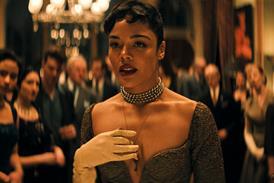UK director Stephen Frears has been awarded the Golden Duke Lifetime Achievement Award during the opening ceremony of the fifth edition of the Odessa International Film Festival (OIFF, July 11-19).
The festival is dedicating an homage to British director Frears, who gave a master class at the parallel Summer School and attended an open-air screening of his latest film Philomena on the city’s Lanzheron Descent steps
Speaking at a press conference at the weekend, Frears said that when he received the invitation to come to Odessa, he recalled a piece by writer Isaac Babel describing the Black Sea port as ¨a gangster town¨. “And then I wanted to come!¨
¨I’ve never been to a city so beautiful,¨ Frears said about his first impressions of Odessa.
Remembering Sentsov
During the opening event at Odessa’s Musical Comedy Theatre, the audience was asked to remember the Ukrainian film-maker Oleg Sentsov who is currently in detention in Russia’s Lefortovo prison accused of terrorist activities.
OIFF has scheduled a special screening of Sentsov’s feature debut Gaamer on Tuesday evening (July 15) to raise funds to meet his legal fees and support his wife and two young children.
Last week, the board of the European Film Academy launched a fund to raise donations to cover the costs of Sentsov’s legal battle and help his young family (www.europeanfilmacademy.org).
Sentsov’s second feature Rhino was pitched as a project in Odessa’s industry programme two years ago and attracted Germany’s Neue Mediopolis Film as a production partner.
Highlights
One of the first weekend’s highlights included an open-air screening of Alfred Hitchcock’s 1929 film Blackmail on the legendary Potemkin Steps to an audience of some 15,000 spectators.
Introduced by the British Council’s Christine Bardsley and Robin Baker, Head Curator of the BFI National Film Archive, the screening was accompanied by a symphony orchestra performing a score composed by the UK’s Neil Brand.
Unity crucial
Speaking at the beginning of this year’s edition, festival president Victoria Tigipko stressed the importance of holding the festival this year at a time when the country was going through a period of crisis: ¨When people go through difficult times, the moment of unity is crucial, the moment to throw off the negative transforming it to the positive, transforming ‘I’ to ‘We’. It was very encouraging to feel the support of the leading world film festivals in our desire to hold the 2014 OIFF.¨
The festival was opened with Italian director Paolo Virzi’s Human Capital which was presented by the film’s costume designer Bettina Pontiggia.
Russian obscenity law claims further ¨victims¨
Meanwhile, in Russia, the new anti-obscenity legislation, which came into effect on July 1 banning the use of swearwords in films and on the stage, has claimed further ¨victims¨ in the film world.
It had been revealed last month that Natalia Meschaninova’s The Hope Factory (Kombinat ¨Nadezhda¨), which had its world premiere in Rotterdam’s Tiger Award competition at the beginning of the year, had been shot in two versions, with one minus swearwords.
However, Meschaninova intends now to retain the original version - which would scotch any chances of obtaining a distribution certificate for an official theatrical release - but said that several cinemas in Moscow have expressed interest in showing the film as it is.
Meschaninova’s debut was made without any government funding and had its Russian premiere at Kinotavr in Sochi last month.
She was also a co-director with Valeria Gai Germanika - whose Yes and Yes was pulled at the last minute from the VOICES festival last week in Vologda - in the TV series School (Shkola).
At the same time, the students of Maria Razbezhkina and Mikhail Ugarov’s School of Documentary Film and Documentary Theatre have decided to boycott those Russian festivals which require proof of distribution certificates for films without government funding before they can be considered for selection.
Moreover, film director-playwright Ivan Vypyraev (known for the films Euphoria and Oxygen) has also had to toe the line on obscene language for his production of Mikhail and Vyacheslav Durnenko’s play The Drunks which is currently being staged at the Chekhov Moscow Arts Theatre.
Film and theatre actor Maxim Matveev, who plays Stavrogin in a new film version of Dostoyevsky’s The Devils and also appears in the forthcoming historical drama Fort Ross, is in the cast of The Drunks.
The play had been performed in the UK as part of a Russian season by the Royal Shakespeare Company in 2009 when the audiences had been warned in advance that the play contains ¨strong language¨.

























No comments yet